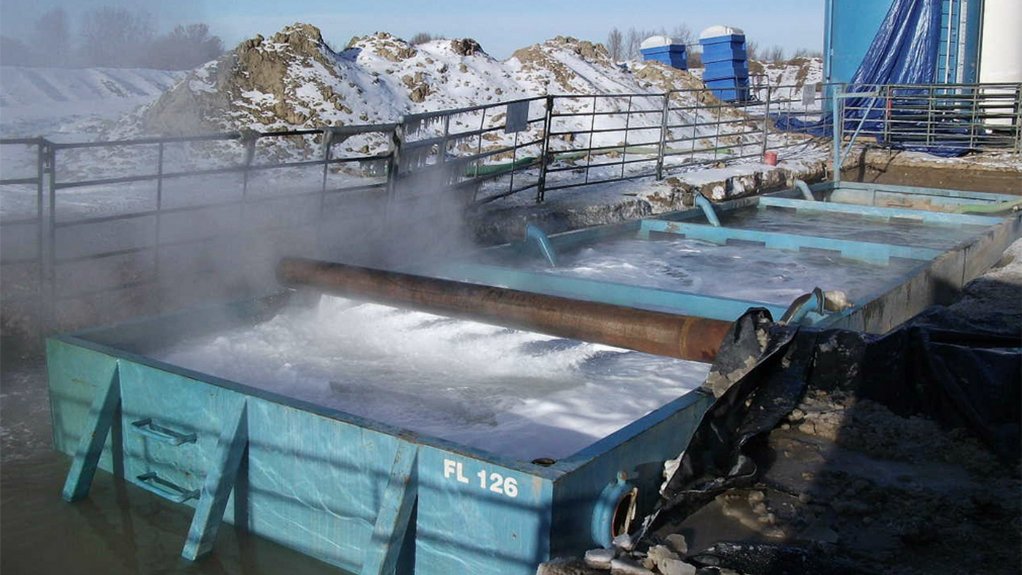TORONTO (miningweekly.com) – India-listed agribusiness firm Gujarat State Fertilisers and Chemicals (GSFC) has agreed in principle to provide $700-million to finance construction of the first phase of project developer Karnalyte Resources’ 625 000 t/y Wynyard potash deposit, in Saskatchewan.
TSX-listed Karnalyte would also spin out secondary mineral assets and unexplored lands into one or more separate entities to achieve a fully financed structure to build its flagship potash mine.
The strategic partnership between Karnalyte and GSFC provided Karnalyte with a significant competitive advantage in the marketplace, and was expected to provide GSFC with a secure supply of potash for many years to come.
The news sent Karnalyte’s stock jumping by as much as 86% on Monday morning to C$1.64 apiece.
“This ground-breaking deal structure demonstrates GSFC's long-term commitment and desire to secure supplies of key natural resources through investment structures that are aligned with the values of Canadian shareholders. I believe this financing will serve as a template for future investment by Indian companies in Canada and will strengthen relations between our two countries for years to come,” commented GSFC senior VP and CFO Vishvesh Nanavaty.
The agreement made provision for senior secured debt, subordinated unsecured debt and an equity infusion to be backstopped by GSFC. Karnalyte advised that this structure allowed for a 3:1 debt-to-equity ratio for the project financing.
The equity component of the project financing was expected to be fulfilled 50% by way of the issuance of common shares by the company, and 50% through issuing unsecured subordinated debt, which was expected to limit the shareholder dilution.
The transaction comprised more than $500-million in debt over a 20-year term; a total equity requirement equal to one-third of the amount of the senior secured debt, with up to 50% to be raised through subordinated unsecured debt and the remainder to be raised through issuing shares, backstop guarantees by GSFC for any shortfalls of equity in the event that Karnalyte was unable to raise sufficient amounts through issuing shares, and backstop guarantees by GSFC in the event of project cost overruns.
As a condition to obtaining the project financing, GSFC was required to have and maintain at least a 51% voting interest in Karnalyte, while the senior secured debt was outstanding. To this end, Karnalyte would issue a non-dilutive ‘special voting share’ to a subsidiary of GSFC.
SECONDARY PROJECTS
Karnalyte would spin out the production rights for a magnesium production facility to a new subsidiary. The facility would have a capacity of 100 000 t/y of magnesium chloride brine and 104 000 t/y of hydromagnesite, a form of basic magnesium carbonate, at 99% purity. Karnalyte's secondary minerals, including magnesium, would be developed in a separate entity to enable current Karnalyte shareholders to benefit from these currently untapped assets.
Further, about 70%, or 241 km2, of Karnalyte’s unexplored lands in the heart of Saskatchewan’s potash belt, would be spun out to a separate entity that would have the benefit of a licence for associated intellectual property to enable it to further explore and develop these currently untapped assets and also enable current Karnalyte shareholders to benefit from their development.
Completion of the proposed transaction was subject to finalising definitive documentation, approval by Karnalyte and GSFC's boards of directors, approval by Karnalyte's shareholders, and regulatory approvals, including the approval of the TSX.
OFFTAKE PLACEMENT
In 2011 Karnalyte received a positive feasibility study prepared by Foster Wheeler Canada and Ercosplan for Karnalyte's plans to construct a solution mining facility at Wynyard, with the aim of producing a high-grade (97% purity) granular potash product.
Karnalyte intended to construct the facility in three phases, with Phase 1 expected to produce about 625 000 t/y, increasing by 750 000 t/y with Phase 2, and totalling 2.13-million tonnes a year with the addition of Phase 3.
Previously in 2013, GSFC, one of India's largest fertiliser and industrial chemicals manufacturing companies, made a strategic investment in Karnalyte of about $44.7-million, resulting in GSFC holding a 19.98% ownership stake in Karnalyte.
During this deal, Karnalyte and GSFC signed an offtake agreement providing for GSFC to buy about 350 000 t/y from Phase 1. The offtake would start with commercial production from Phase 1, which would result in Karnalyte having secured sales for about 56% of its potash production from Phase 1 for about 20 years.
The offtake agreement also provided GSFC with the option to increase its offtake by 250 000 t/y to 600 000 t/y from the date when Phase 2 started commercial production. The agreement also provides GSFC with the potential to increase its offtake by up to 400 000 t/y from Phase 3, for a total yearly volume of up to one-million tonnes a year.
Potash prices were expected to remain under pressure this year while a new wave of greenfield supply came online.
This would build up to a scenario where potash supply would be out of balance for more than a decade.
Significant projects in the pipeline included BHP Billiton’s $2.6-billion Jansen potash project, in Saskatchewan, and K+S Group’s $4.1-billion Legacy project, which was expected to start producing late in 2016, as well as other significant projects coming on stream across the Pacific Ocean.
India was ramping up its minerals investment offshore, having previously agreed to enter the Canadian uranium market with a C$350-million, 7.1-million pounds uranium supply contract inked with Canadian producer Cameco.
Edited by: Samantha Herbst
Creamer Media Deputy Editor
EMAIL THIS ARTICLE SAVE THIS ARTICLE
To subscribe email subscriptions@creamermedia.co.za or click here
To advertise email advertising@creamermedia.co.za or click here













